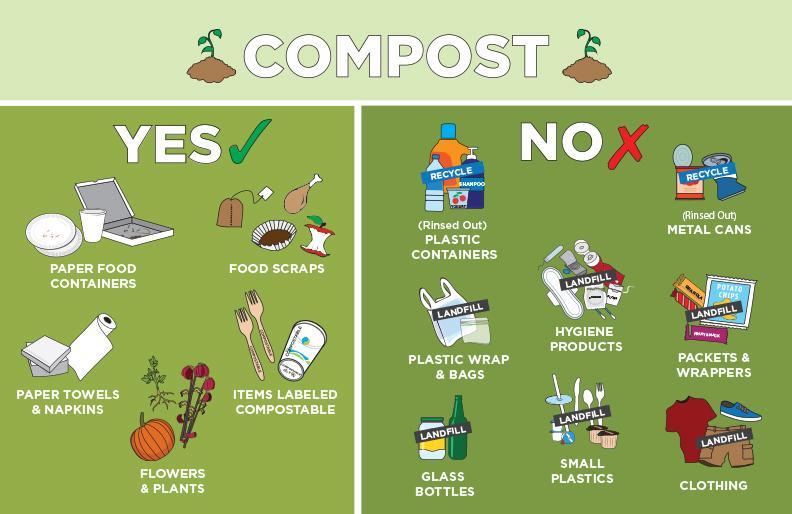Simply put, compost is anything natural that comes from the earth that will decompose over time. This includes the following: food scraps, soiled paper, paper containers, tea bags, coffee grounds, and compostable plastics. At the University of Maryland, you can find compost collection bins throughout campus. Please limit contamination by only placing compostable items in these bins. Learn more on the UMD Facilities Management site.
Where to Compost on Campus
Compost collection is currently available in numerous administrative, academic, and residential buildings on campus. Email recycle@umd.edu with any questions.
How to compost at UMD
What can be tossed into campus compost bins:
- Food Waste: fruit, vegetables, meat, bread, etc.
- Soiled Paper: paper towels, plates, tissues, napkins
- Tea/Coffee: tea bags (with staples), coffee grounds, coffee filters
- Paper Containers: pizza boxes; compostable cups and cutlery; waxed and soiled paper take-out containers, cups, and plates (empty cups of all liquid before composting)
- Others: plants, flowers, other items marked "compostable"

Request compost bins for an event
Recent state legislation now requires the collection of compostable materials every time food is served on the UMD campus. House Bill 264/Senate Bill 483, entitled “Solid Waste Management Organics Recycling and Waste Diversion – Food Residuals,” requires composting all food scraps from any campus event, whether a student group meeting, a small staff meeting or a large event. You can fill out a work request form to request compost bins for your event.
All compostables must be collected in approved bags. View the list of bags approved by the local composting facility.
What is compost?
Compost is created by the biological decomposition of organic material. Once compostable material undergoes this natural process, which can be accelerated by modern technology, the final product is useful for:
- Agriculture
- Erosion and sediment control
- Stormwater management
- Forest fire reclamation
- Sold to consumers to be used as a soil amendment instead of chemical fertilizers
Compost adds nutrients, organic matter, and microorganisms to soil! In contrast to the traditional recycling process, compostable materials are usually collected, processed, and distributed locally.
Why compost?
As listed above, there are numerous uses for compost. In addition, collecting materials for compost will:
- Conserve landfill capacity
- Reduce methane (a greenhouse gas) from landfills
- Reduce transportation of discarded materials
- MAKE COMPOST, a nutrient-dense fertilizer for plants!
Where does UMD's compost go?
The compostable material collected on campus is delivered to Western Branch, the Prince George’s County Compost Facility. This facility is owned and operated by the Maryland Department of the Environment and collects yard trim, Christmas trees, pumpkins, and other compostable material from within Prince George’s County and the surrounding areas.
The compost created through our partnership with Prince George’s County is also used at our own Terp Farm!
Expanding compost collection
The Facilities Management Recycling Unit is working in conjunction with many campus groups to continuously expand compost collection throughout the UMD community.
Questions? Email recycle@umd.edu.